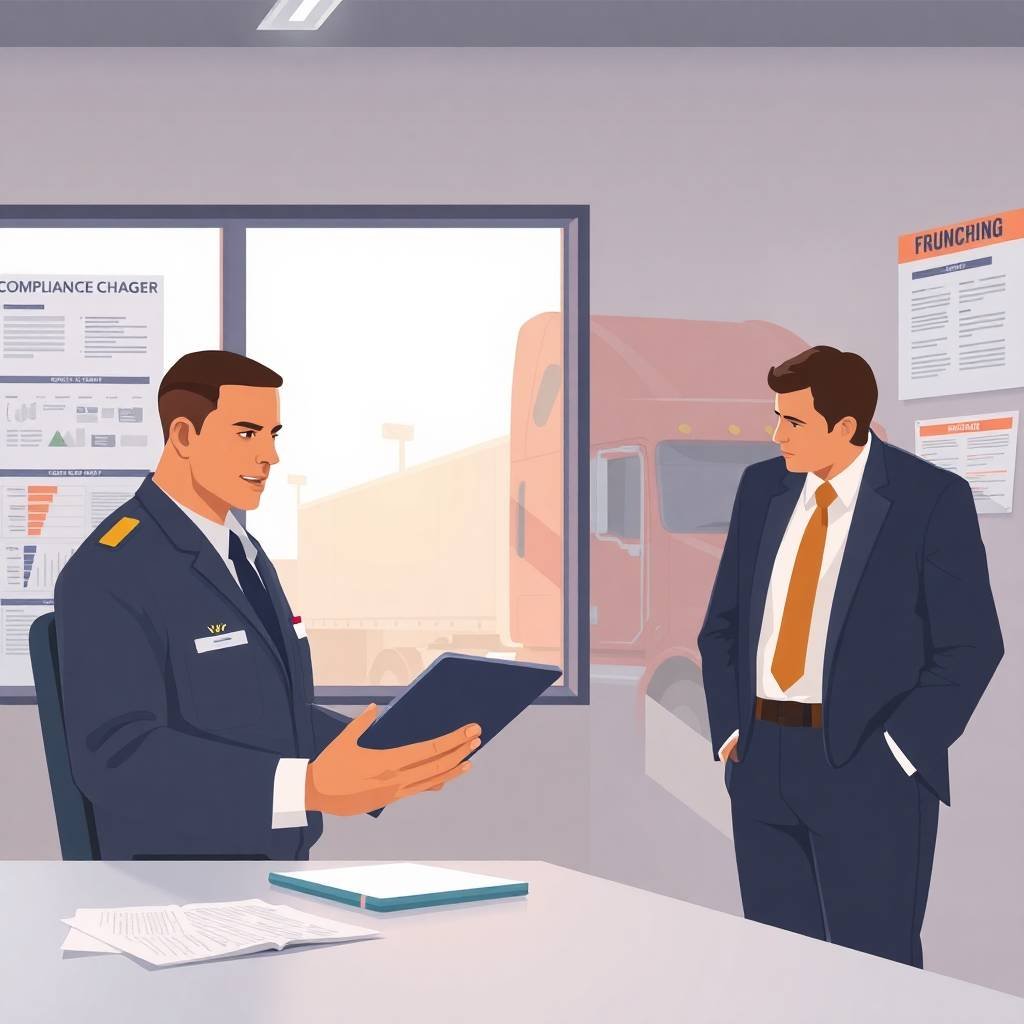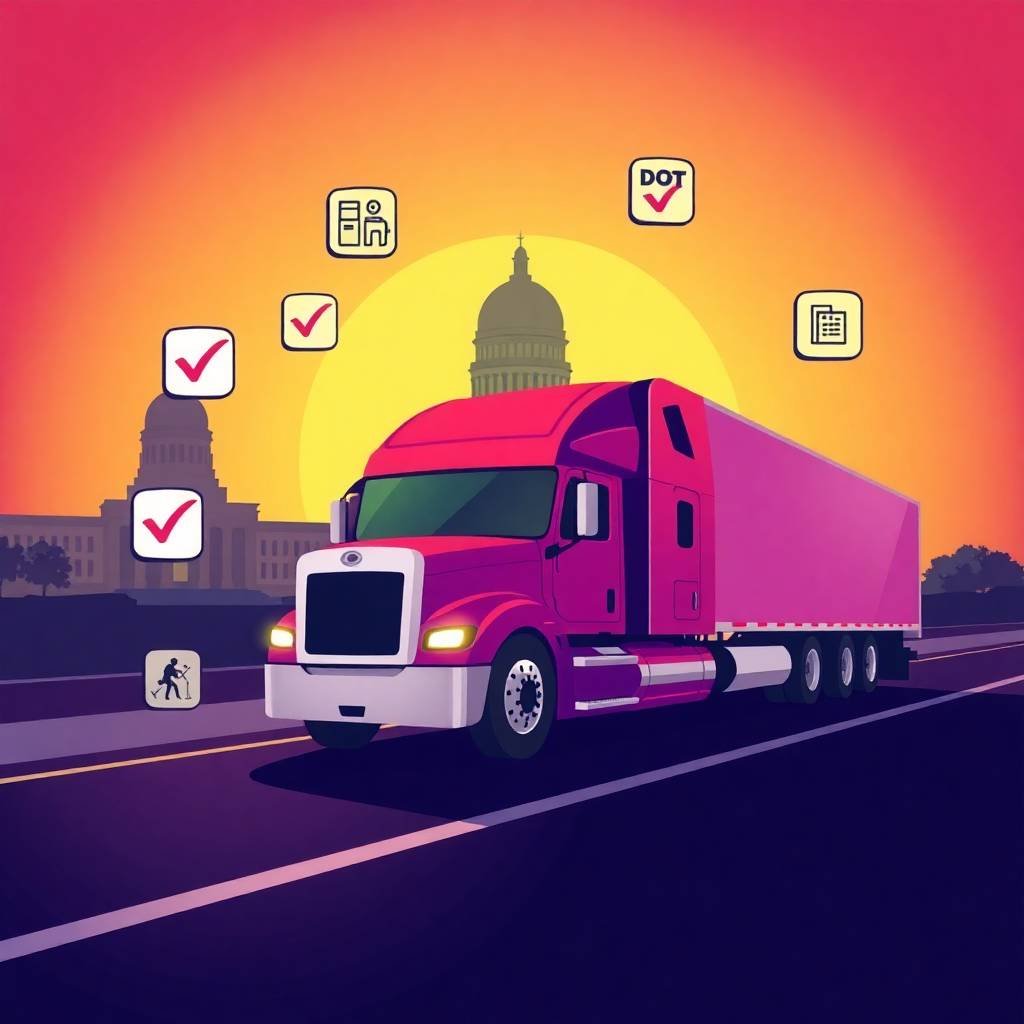1. Ignoring Pre-Employment Testing Requirements
Maintaining drug and alcohol testing compliance is not just a best practice—it’s a legal necessity under FMCSA regulations. One of the most overlooked but critical areas in this process is pre-employment testing. Ignoring or mishandling this requirement can severely impact your company’s safety rating and lead to hefty fines, disqualification, or even shutdowns.
In this article, we’ll explore why pre-employment testing is a cornerstone of drug and alcohol testing compliance, and how non-compliance can jeopardize your entire operation.
The FMCSA Mandate on Pre-Employment Testing
According to the Federal Motor Carrier Safety Administration (FMCSA), all CDL drivers must pass a negative drug test before performing any safety-sensitive functions. Alcohol testing, while not mandatory pre-employment, must still follow strict procedural guidelines if administered. Failure to conduct or properly document this test is considered a major compliance violation.
Many fleet owners mistakenly believe that an applicant’s prior test results or history can be used to bypass this requirement. The truth is, every driver must have a new, verified negative result before they can drive commercially for your company.
Consequences of Non-Compliance
The risks of neglecting pre-employment testing extend beyond fines. Your company’s CSA (Compliance, Safety, Accountability) score is directly influenced by drug and alcohol violations. A poor score can lead to increased insurance costs, heightened DOT scrutiny, and reduced contract opportunities.
Additionally, failing a DOT audit can cripple operations. Visit our guide on DOT Audit Preparation to ensure you’re ready.
Pre-Employment Testing and DQ File Integration
Every drug and alcohol testing compliance step must be accurately documented within your DQ file. Failing to link test results to your DQ File Setup and Monitoring process is a surefire way to lose control of your compliance strategy.
You should also ensure your testing procedures are integrated into a broader Drug and Alcohol Testing Management framework for ongoing monitoring and recordkeeping.
Beyond Testing: Compliance Infrastructure Matters
Neglecting pre-employment testing often signals a deeper issue—lack of structured compliance support. From UCR Filing Assistance to IFTA, IRP & BOC-3 Support, a complete compliance infrastructure protects your business from unexpected failures.
Additionally, staying informed with updates from authoritative sources such as the U.S. Department of Transportation and the White House can help you stay ahead of regulatory changes.
Take Proactive Steps Today
Don’t wait for a failed audit to fix compliance issues. If you’re unsure whether your company is meeting drug and alcohol testing compliance requirements, it’s time to act. Visit Truckers Compliance Hub to view the latest posts and resources or schedule a 30-minute strategy session with a compliance expert today.
Final Thoughts
Ignoring pre-employment testing requirements is more than a procedural lapse—it’s a threat to your company’s credibility and operational survival. Making drug and alcohol testing compliance a central part of your hiring and safety strategy not only protects your business but also reinforces your commitment to roadway safety.
Stay ahead, stay compliant, and ensure every driver you hire strengthens—rather than risks—your safety record.

2. Random Testing Mismanagement: How Small Errors Lead to Big Penalties
In the world of commercial transportation, Drug and Alcohol Testing Compliance isn’t just a regulatory checkbox—it’s a critical pillar of operational safety and legal protection. Among the most frequently mishandled areas of compliance is random testing. While it may seem routine, even minor missteps in this process can result in major fines, failed audits, or an elevated CSA score.
The Purpose and Power of Random Testing
The Federal Motor Carrier Safety Administration (FMCSA) requires that carriers conduct random drug and alcohol testing throughout the year. This method ensures that all CDL drivers are equally subject to compliance standards, regardless of tenure or past test results. The U.S. Department of Transportation enforces strict criteria for pool selection, test frequency, documentation, and timely follow-through.
Unfortunately, many carriers don’t realize that a single missed test, improperly selected driver, or late notification can lead to significant violations under Drug and Alcohol Testing Compliance protocols.
Common Random Testing Errors That Trigger Penalties
1. Incomplete or Inaccurate Pool Management
Carriers often fail to maintain an updated and compliant driver pool. If a driver no longer performs safety-sensitive duties but is still listed, or if new drivers aren’t added promptly, you’re in violation. For streamlined support, our Drug and Alcohol Testing Management system can help.
2. Missed Testing Deadlines
Drivers must report for testing immediately upon notification. Allowing delays, providing advance notice, or testing outside the specified window are all violations—even if the test is eventually completed.
3. Improper Documentation
Failure to document selection methods, notifications, or test results can result in a failed DOT audit. Accurate, consistent recordkeeping is essential to maintain Drug and Alcohol Testing Compliance.
4. Excluding CDL Drivers from the Pool
Only testing certain departments or overlooking part-time CDL holders is another red flag. Every safety-sensitive employee must be included.
The Ripple Effect of Small Compliance Errors
Seemingly minor mistakes in random testing management can spiral into serious consequences. A pattern of non-compliance can increase your insurance premiums, delay contract approvals, and impact your CSA scores. Worse yet, violations discovered during an audit can result in business-threatening fines or out-of-service orders.
Avoid these pitfalls by integrating random testing into your broader compliance structure. Our DQ File Setup and Monitoring service ensures all driver information is linked to testing records. We also assist with UCR filing and IFTA/IRP/BOC-3 support, ensuring you’re covered from every angle.
Stay Proactive with Professional Support
The best way to secure Drug and Alcohol Testing Compliance is by acting before the FMCSA knocks on your door. Schedule a 30-minute compliance consultation to audit your current procedures and fix gaps before they become penalties.
Don’t forget to check out Truckers Compliance Hub for the latest updates and insights tailored to fleet managers and owner-operators.
Final Thoughts
Random testing mismanagement is one of the easiest ways to fall out of Drug and Alcohol Testing Compliance—but also one of the most preventable. With proper systems, documentation, and proactive management, you can protect your fleet, your reputation, and your bottom line.
Stay ahead, stay compliant, and let the experts help you navigate complex regulations with confidence. For continuous updates on federal compliance shifts, visit the White House and FMCSA regularly.
3. The Cost of Skipping Post-Accident Testing Protocols
In the trucking industry, maintaining Drug and Alcohol Testing Compliance is not just about following the rules—it’s about protecting your company’s future. One of the most commonly overlooked requirements under FMCSA regulations is post-accident testing. Failing to conduct timely, accurate testing after a qualifying accident can lead to severe penalties, audit failures, and even litigation.
Why Post-Accident Testing Is Non-Negotiable
The U.S. Department of Transportation mandates post-accident drug and alcohol testing under specific conditions, such as when there’s a fatality, a citation issued for a moving violation, or when a vehicle must be towed. These tests must be conducted within a set timeframe—alcohol testing within 8 hours and drug testing within 32 hours.
Skipping or delaying these procedures undermines your Drug and Alcohol Testing Compliance, exposing your business to potential FMCSA fines and loss of operating authority.
Real Costs of Non-Compliance
The immediate financial costs are only the beginning. Penalties for non-compliance can range from thousands to tens of thousands of dollars. More importantly, your company risks a failed DOT audit, which can lead to increased insurance premiums, reduced business opportunities, and even federal investigations.
Missed post-accident tests also damage your reputation and legal standing in the event of a lawsuit. Plaintiff attorneys often scrutinize Drug and Alcohol Testing Compliance when building a negligence case. If your company can’t prove it followed the required protocols, you may face far greater liabilities than the original accident damages.
The Role of Internal Procedures and Training
To remain compliant, your staff must be trained to respond immediately following a qualifying accident. This includes knowing when and how to arrange testing, who to contact, and what documentation to complete. A strong internal system ensures that critical testing windows aren’t missed.
Utilizing professional services like Drug and Alcohol Testing Management can help centralize your compliance process and remove guesswork from post-accident situations.
Support Systems That Reduce Risk
Maintaining Drug and Alcohol Testing Compliance also requires an integrated compliance strategy. Your DQ File Setup and Monitoring, UCR filing, and IFTA/IRP/BOC-3 support must align with your testing protocols to ensure all driver activity is properly documented and traceable.
Want to avoid costly oversights? Schedule a compliance review to assess your post-accident response systems and strengthen your readiness.
Take Action Before It’s Too Late
Compliance is not a reactive process—it’s proactive. Visit Truckers Compliance Hub to stay up to date with industry regulations and learn how to avoid the most common mistakes that undermine your operations. With policy changes often influenced by national priorities, following sites like the White House can help you stay alert to evolving safety expectations.
Final Thoughts
Skipping post-accident testing protocols is more than a paperwork problem—it’s a direct threat to your business. Drug and Alcohol Testing Compliance is a federally mandated safeguard, and missing even one step can have lasting consequences. Prioritize preparedness, reinforce your internal systems, and partner with compliance experts to ensure your business remains protected and operational—no matter what the road throws your way.

4. Lack of a Written Drug and Alcohol Testing Compliance Policy
In the commercial transportation industry, Drug and Alcohol Testing Compliance is not optional—it’s a legal obligation under FMCSA regulations. Yet, many motor carriers continue to operate without a clear, written policy that outlines testing protocols, responsibilities, and employee expectations. This oversight creates significant legal and operational vulnerabilities.
Why a Written Policy is Non-Negotiable
Having a formal Drug and Alcohol Testing Compliance policy is critical for several reasons. First, it ensures that all employees—drivers, managers, and compliance officers—understand their roles in maintaining safety. Second, it provides a consistent framework for handling pre-employment, random, post-accident, reasonable suspicion, and return-to-duty testing. Without it, compliance becomes subjective, error-prone, and difficult to defend during a DOT audit.
The U.S. Department of Transportation mandates that all motor carriers subject to drug and alcohol testing must have a clearly written policy in place and communicate it effectively to employees.
The Compliance and Legal Risks of Operating Without One
Failure to implement a documented Drug and Alcohol Testing Compliance policy is a direct violation of federal law. Carriers may face hefty fines, failed audits, and a damaged safety rating. Worse, if a compliant policy is not in place during an accident investigation, companies may be found negligent, increasing their exposure to litigation and liability.
Businesses can explore previous articles like FMCSA Compliance Mistakes and Driver Qualification File Requirements to understand how seemingly small oversights can snowball into major infractions.
Connecting Compliance With Operational Readiness
Written policies do more than meet regulatory standards—they also streamline operations. When drivers and staff are clear about testing procedures and timelines, there’s less confusion and non-compliance. Partnering with an expert in Drug and Alcohol Testing Management can help ensure your protocols are current and defensible under federal scrutiny.
Combine this with services like DQ File Setup and Monitoring, IFTA/IRP/BOC-3 Support, and UCR Filing Assistance to build a robust compliance infrastructure.
Preparing for What Comes Next
The FMCSA Safety Measurement System (SMS) changes and DOT audit trends in 2025 emphasize a heightened focus on documented compliance. If your organization is not actively revising its policies, you may fall behind. Explore our recent guide: DOT Audit Preparation 2025 to see what’s changing and how to respond.
Start Strengthening Your Compliance Today
Whether you’re a small carrier or manage a large fleet, the absence of a written Drug and Alcohol Testing Compliance policy is a red flag that regulators won’t ignore. Don’t wait until a failed audit or serious accident exposes the gap.
You can schedule a free 30-minute consultation to assess your current compliance strategy. For more insights and tools, visit Truckers Compliance Hub and review our DOT Compliance Checklist.
As federal regulations evolve and enforcement intensifies—tracked closely by agencies like the White House—having a written Drug and Alcohol Testing Compliance policy is your first line of defense.
5. Using Non-Certified Labs or Testing Technicians
When it comes to Drug and Alcohol Testing Compliance, precision and professionalism are not just preferred—they’re federally mandated. One of the most overlooked but critical mistakes carriers make is using non-certified laboratories or unqualified testing technicians. This seemingly small misstep can result in failed audits, expensive penalties, and even disqualified drivers.
Why Certification Matters in Drug and Alcohol Testing Compliance
The Federal Motor Carrier Safety Administration (FMCSA) requires all drug and alcohol tests to be conducted by certified labs and trained personnel. This ensures accuracy, consistency, and defensibility in test results. Working with non-certified vendors puts your entire Drug and Alcohol Testing Compliance program at risk.
If your organization is selected for a DOT audit, as outlined in our DOT Audit Preparation Guide, auditors will inspect documentation to verify that labs and collectors meet federal standards. Using unapproved facilities or staff may lead to test results being invalidated—and worse, considered falsified.
To better understand how these compliance details matter, visit the FMCSA website or explore related enforcement policies via Transportation.gov.
Consequences of Using Non-Certified Resources
Failing to use certified labs or collectors can derail your Drug and Alcohol Testing Compliance program. This violation may result in fines, damaged CSA scores, and the inability to defend yourself in accident litigation. Worse, it may disqualify your driver if an unverified test procedure fails to meet required standards.
Our breakdown of FMCSA Compliance Mistakes highlights how such oversights frequently show up during compliance reviews. These errors aren’t just technical—they’re operational hazards that can cripple your business.
How to Verify Compliance in Your Testing Program
Partnering with an expert team can help you audit and validate your testing partners. At Truckers Compliance Hub, we specialize in Drug and Alcohol Testing Management and can help ensure that every component of your program meets DOT and FMCSA regulations.
We also assist with DQ File Setup and Monitoring, UCR Filing, and IFTA/IRP/BOC-3 Support, building a full-scale compliance infrastructure tailored to your fleet.
Check out our insights on the 2025 DOT Audit Preparation and the evolving FMCSA Safety Measurement System to stay ahead.
Compliance Isn’t Just a Checklist—It’s a Strategy
Many carriers treat Drug and Alcohol Testing Compliance as a back-office function. But the truth is, it directly impacts your company’s safety score, insurance rates, and liability profile. Make use of our DOT Compliance Checklist to evaluate your current standing and address any gaps proactively.
If you’re not sure whether your testing labs or technicians meet certification requirements, schedule a 30-minute strategy session with our compliance experts.
A Higher Standard, a Safer Fleet
As the White House and FMCSA place growing emphasis on driver safety and accountability, your Drug and Alcohol Testing Compliance practices will come under increasing scrutiny. Don’t let a lack of due diligence on your vendors jeopardize your business. Visit Truckers Compliance Hub to access the latest resources and compliance strategies built to keep you audit-ready year-round.

6. Failing to Train Supervisors for Reasonable Suspicion Testing
In the world of DOT-regulated transportation, maintaining Drug and Alcohol Testing Compliance is more than just a requirement—it’s a responsibility. One of the most overlooked yet critical components of compliance is training supervisors to recognize signs of impairment and to act appropriately through reasonable suspicion testing. Failing to do so can lead to significant regulatory violations, financial penalties, and safety risks.
The Role of Supervisor Training in Compliance
Under FMCSA regulations, all supervisors of commercial drivers must undergo at least 120 minutes of training—60 minutes each on alcohol misuse and controlled substance use. This training helps supervisors identify observable symptoms of substance use and take immediate, lawful action.
When organizations skip this step, they create a glaring gap in their Drug and Alcohol Testing Compliance strategy. An untrained supervisor may hesitate or fail to act when a driver shows signs of impairment, putting everyone on the road at risk. More importantly, this failure can severely harm your company’s safety rating, as outlined on the FMCSA website.
Regulatory and Safety Consequences
Noncompliance in this area is not just a paperwork issue. If a driver under the influence is involved in a crash and the supervisor failed to act based on obvious symptoms, your company could face legal liability, increased insurance costs, and DOT enforcement action. Visit Transportation.gov and the White House website for additional policy context around national transportation safety priorities.
We break down similar regulatory pitfalls in our guide on FMCSA Compliance Mistakes, which includes reasonable suspicion testing among common problem areas.
Ensuring Supervisors Are Trained and Audit-Ready
From a compliance perspective, having documentation of supervisor training is essential during a DOT audit. Our DOT Audit Preparation checklist includes supervisor training records as a key item reviewed by auditors.
At Truckers Compliance Hub, we offer support with Drug and Alcohol Testing Management, as well as DQ File Setup and Monitoring, UCR Filing Assistance, and IFTA/IRP/BOC-3 Support. Our services ensure that every piece of your Drug and Alcohol Testing Compliance framework is solid and up-to-date.
Make Supervisor Training Part of Your Strategy
A well-trained supervisor isn’t just a compliance requirement—they’re your front line in preventing impaired driving. By ensuring they know how to identify, document, and act on reasonable suspicion, you demonstrate your company’s commitment to safety and compliance. Explore related topics in our Driver Qualification File Requirements article or dive into the future of enforcement with our FMCSA SMS 2025 breakdown.
Need a plan to get your team trained and compliant fast? Book a 30-minute consultation with one of our compliance specialists today.
Don’t Leave Compliance to Chance
Ignoring supervisor training undermines your entire Drug and Alcohol Testing Compliance program. Take proactive steps to secure your safety standing and protect your fleet. Visit Truckers Compliance Hub for practical insights, including our 2025 DOT Audit Preparation and DOT Compliance Checklist.
7. Inadequate Recordkeeping: A Silent Compliance Killer
When it comes to Drug and Alcohol Testing Compliance, one of the most overlooked threats to DOT-regulated businesses is poor recordkeeping. You can have the best intentions, rigorous testing schedules, and well-trained staff—but if your records aren’t in order, you’re exposing your fleet to major liability.
Whether it’s missing chain-of-custody forms, outdated policy acknowledgments, or absent test result documentation, these seemingly minor issues can become compliance nightmares during a DOT audit. Inadequate recordkeeping isn’t just a clerical error—it’s a silent compliance killer.
Why Recordkeeping Is the Backbone of Compliance
The Federal Motor Carrier Safety Administration (FMCSA) mandates that all employers involved in DOT-regulated drug and alcohol testing must retain specific records for set time periods. This includes negative test results, supervisor training records, lab certifications, and driver acknowledgments. Failing to maintain these records can result in serious penalties and compromised safety ratings under the FMCSA’s Safety Measurement System (SMS).
At Truckers Compliance Hub, we regularly encounter carriers who are otherwise compliant in practice but fail during audits due to missing or disorganized records. That’s why our Drug and Alcohol Testing Management service prioritizes accurate, secure recordkeeping systems that align with FMCSA rules.
The Impact on DOT Audits and Fleet Operations
Poor recordkeeping can quickly derail your audit readiness. In our 2025 DOT Audit Preparation Guide, we emphasize that documentation is your best defense. Without it, proving Drug and Alcohol Testing Compliance becomes nearly impossible—even if every driver was properly tested.
Additionally, recordkeeping issues often overlap with other compliance gaps, such as disorganized Driver Qualification (DQ) files and expired UCR filings. These errors compound, affecting not only safety scores but also company reputation and insurance premiums.
Building a Proactive Recordkeeping System
Start by auditing your current recordkeeping practices. Are your documents centralized and accessible? Are retention timelines met? Do you have digital backups? If not, it’s time to overhaul your system.
Our team also recommends integrating services like IFTA/IRP/BOC-3 support to ensure that compliance tasks don’t fall through the cracks. You can explore past insights and best practices on our blog, including posts like DOT Compliance Checklist and Driver Qualification File Requirements.
For help navigating your recordkeeping needs, schedule a 30-minute consultation with a compliance expert. We’ll walk you through proven strategies for maintaining airtight documentation.
Don’t Let Records Become Your Weakest Link
Drug and Alcohol Testing Compliance is not just about testing—it’s about proving that you’ve tested, and that every step aligns with FMCSA expectations. Visit the U.S. Department of Transportation or White House Transportation Policy pages to better understand the national priorities for safety and accountability.
Failing to prioritize recordkeeping can leave your company vulnerable. Avoid becoming a statistic in our FMCSA Compliance Mistakes roundup—take control of your compliance now.

8. Misunderstanding FMCSA Return-to-Duty Procedures
Navigating the Federal Motor Carrier Safety Administration (FMCSA) regulations can be overwhelming—especially when it comes to Drug and Alcohol Testing Compliance. One of the most misunderstood aspects is the Return-to-Duty (RTD) process following a DOT drug or alcohol violation. Misinterpretation of these procedures can lead to serious consequences, including costly fines, operational delays, or even disqualification of drivers.
The Importance of Understanding FMCSA Return-to-Duty
The FMCSA outlines clear steps for the RTD process, but many motor carriers and drivers underestimate its complexity. Once a driver violates the Drug and Alcohol Testing Compliance rules, they cannot return to safety-sensitive duties until completing a specific series of evaluations and tests. These steps are explained in detail on the FMCSA official site, but even a slight oversight can trigger further compliance violations.
Noncompliance not only jeopardizes safety but also invites unwanted attention from DOT auditors. To prepare adequately, carriers can benefit from professional support through DOT audit preparation services, ensuring every step of the RTD procedure is followed precisely.
Key Steps Often Overlooked
One common mistake is assuming a driver can simply pass a drug test and return to work. In reality, Drug and Alcohol Testing Compliance requires the driver to first be evaluated by a Substance Abuse Professional (SAP). Following the SAP’s recommendations, the driver must complete a prescribed treatment or education program and then pass a Return-to-Duty test under direct observation.
The Department of Transportation mandates strict adherence to these steps. Employers are also required to maintain detailed documentation throughout this process, typically within the Driver Qualification File (DQF), another essential part of a company’s compliance management system.
Why Carriers Continue to Get It Wrong
Despite increased awareness, many fleets still fall short in managing Drug and Alcohol Testing Compliance correctly. These failures often stem from a lack of internal expertise or outdated processes. As highlighted in our previous post on FMCSA Compliance Mistakes, carriers frequently overlook the need for ongoing monitoring and recordkeeping post-violation.
That’s why engaging with reliable compliance services, such as Drug and Alcohol Testing Management, is critical. These solutions help ensure all RTD procedures are followed meticulously and in real-time.
Get Help Before It’s Too Late
The cost of noncompliance can be steep, particularly as enforcement tightens. To avoid penalties and keep your operations running smoothly, consider using our DOT Audit Preparation 2025 guide to ensure your processes align with FMCSA expectations.
For carriers managing multiple compliance requirements—from UCR filing to IFTA, IRP, and BOC-3 support—streamlined compliance systems can make all the difference. Schedule a free consultation now through our appointment portal.
Stay Updated and Stay Compliant
At Truckers Compliance Hub, we continuously publish insights to keep you informed. Visit our latest posts page and explore topics like Driver Qualification File Requirements or FMCSA Safety Measurement System (SMS) 2025.
Failing to fully grasp the FMCSA Return-to-Duty process can derail your entire compliance framework. Ensure your Drug and Alcohol Testing Compliance strategy is robust, up-to-date, and aligned with evolving federal expectations by staying informed and leveraging expert support. Even national policies from the White House reinforce the need for a safety-first, compliance-forward approach across transportation sectors.
A proactive approach to Drug and Alcohol Testing Compliance today prevents costly setbacks tomorrow.

9. Neglecting Clearinghouse Requirements and Queries
Since its launch in 2020, the FMCSA Drug and Alcohol Clearinghouse has become a cornerstone of Drug and Alcohol Testing Compliance. Yet, many carriers continue to overlook their responsibilities regarding Clearinghouse requirements and queries, placing their operations and safety ratings at significant risk. Failure to meet these obligations can lead to costly penalties and diminished trust from regulators and business partners.
What the Clearinghouse Is and Why It Matters
The Clearinghouse is a secure online database mandated by the Federal Motor Carrier Safety Administration (FMCSA). It tracks violations of Drug and Alcohol Testing Compliance for CDL drivers, ensuring employers have access to real-time data during the hiring and annual review processes.
Employers are required to perform both pre-employment and annual queries to verify that a driver is not prohibited from performing safety-sensitive functions. Additionally, they must report any violations or Return-to-Duty progress to the Clearinghouse. Ignoring these mandates can result in fines of up to $5,833 per violation, according to guidelines from the Department of Transportation.
Common Mistakes Carriers Make
Many carriers mistakenly believe that if a driver self-reports or passes a standard drug test, no further action is needed. However, Drug and Alcohol Testing Compliance under the Clearinghouse involves far more. Employers must register with the Clearinghouse, conduct timely queries, and document all activity within their Driver Qualification Files (DQFs).
Our post on FMCSA Compliance Mistakes details the recurring errors carriers make, including failure to designate a consortium/third-party administrator or misunderstanding the differences between full and limited queries.
Staying Compliant: A Multi-Step Approach
To maintain Drug and Alcohol Testing Compliance, employers must integrate the Clearinghouse requirements into their ongoing compliance strategy. This includes:
- Registering in the FMCSA Clearinghouse
- Conducting pre-employment full queries
- Performing annual limited queries
- Reporting all violations and Return-to-Duty steps
- Maintaining all records and documentation in the DQFs
At Truckers Compliance Hub, we offer tailored Drug and Alcohol Testing Management services to ensure you stay fully compliant. From DOT audit preparation to UCR filing and IFTA/IRP/BOC-3 support, we simplify the process and reduce the risk of noncompliance.
Be Proactive, Not Reactive
Noncompliance often stems from poor planning or lack of awareness. That’s why we’ve created a DOT Compliance Checklist and a new DOT Audit Preparation 2025 guide to help you align your policies with FMCSA expectations. Additionally, our Driver Qualification File Requirements guide walks you through how to maintain compliance-ready documentation.
To review the latest updates and insights on Drug and Alcohol Testing Compliance, explore our full archive of compliance blog posts. Stay ahead of changes being influenced by federal agencies like the White House and regulatory bodies like the FMCSA.
Get Help Today
If you’re unsure about your current compliance status, now is the time to act. Schedule a consultation through our appointment portal to review your compliance gaps and plan your next steps.
Neglecting Clearinghouse responsibilities isn’t just a paperwork issue—it’s a serious breach of Drug and Alcohol Testing Compliance that could jeopardize your entire operation. Protect your fleet, reputation, and business by taking Clearinghouse compliance seriously today. For more insights, don’t miss our recent analysis on the FMCSA Safety Measurement System (SMS) 2025.

10. Assuming Owner-Operators Are Exempt from Testing Rules
In the world of commercial trucking, misunderstanding regulations can lead to costly mistakes. One of the most persistent myths is that owner-operators are somehow exempt from Drug and Alcohol Testing Compliance requirements. This assumption is not only incorrect but also places carriers and independent drivers at serious risk of noncompliance with FMCSA regulations.
FMCSA Regulations Apply to Everyone—Including Owner-Operators
The Federal Motor Carrier Safety Administration (FMCSA) mandates that Drug and Alcohol Testing Compliance applies to all CDL drivers operating commercial motor vehicles, including owner-operators. Whether you’re running under your own authority or leased to another carrier, you must comply with pre-employment, random, post-accident, reasonable suspicion, and return-to-duty testing protocols.
Owner-operators cannot self-administer these tests. Instead, they must enroll in a DOT-qualified Consortium/Third-Party Administrator (C/TPA), as outlined on the Department of Transportation website. Our Drug and Alcohol Testing Management services at Truckers Compliance Hub provide complete support to meet these requirements and avoid costly violations.
The Most Common Mistakes Owner-Operators Make
One critical error is assuming that because they own their business, they are exempt from Drug and Alcohol Testing Compliance protocols. In fact, the opposite is true—owner-operators must adhere to all rules, including maintaining proper documentation, participating in a random testing pool, and ensuring accurate reporting to the FMCSA Clearinghouse.
Our article on FMCSA Compliance Mistakes dives deeper into common oversights, such as failing to register with the Clearinghouse or neglecting to retain required records in Driver Qualification Files.
Compliance Starts with Preparation and Awareness
Proper Drug and Alcohol Testing Compliance begins with thorough planning. Resources like our DOT Audit Preparation guide and updated 2025 Audit Checklist help owner-operators prepare for audits, identify weaknesses, and take corrective actions.
If you’re managing your own authority, you’ll also need to handle UCR filing, IFTA/IRP/BOC-3 documentation, and ensure your safety scores meet acceptable thresholds under the new FMCSA Safety Measurement System 2025.
Staying current with regulatory updates is crucial. Visit Truckers Compliance Hub regularly to access recent posts, such as our DOT Compliance Checklist and Driver Qualification File Requirements, which break down the documentation standards required by federal law.
Why Owner-Operators Need Professional Support
Maintaining Drug and Alcohol Testing Compliance as an owner-operator isn’t optional—it’s a legal necessity. Many independent drivers assume they can manage compliance solo, only to find themselves overwhelmed by reporting requirements, missed tests, or failed audits.
To avoid regulatory pitfalls and potential shutdowns, schedule a personalized consultation via our appointment portal. Whether you’re new to the industry or a seasoned operator, we provide expert guidance tailored to your specific needs.
Compliance Is a Federal Priority
Agencies like the White House and FMCSA are reinforcing safety-first policies across all levels of transportation. Ensuring your operation meets federal Drug and Alcohol Testing Compliance standards isn’t just good business—it’s a legal imperative.
Owner-operators must reject the myth of exemption and embrace a proactive approach to compliance. With proper tools, expert support, and updated knowledge, staying compliant is completely achievable.
What is the biggest mistake carriers make in drug and alcohol testing compliance?

One of the most damaging mistakes is failing to conduct random testing throughout the year. Many carriers either neglect to test the required percentage of drivers or forget to spread tests randomly across the calendar year. This lapse in drug and alcohol testing compliance can lead to significant DOT violations and negatively impact your safety score. To avoid this, consider enrolling in a reliable Drug and Alcohol Testing Management program that ensures consistent, regulation-compliant testing protocols.
How can inaccurate or missing DQ files impact drug and alcohol testing compliance?

Incomplete or disorganized Driver Qualification (DQ) files can trigger audit failures, especially when tied to drug and alcohol testing compliance violations. Missing documentation such as pre-employment drug test results or consent forms may suggest systemic noncompliance. Carriers should invest in professional DQ file setup and monitoring services to maintain audit-ready files and protect their safety ratings.
Is failing to register with the FMCSA Clearinghouse a compliance issue?

Absolutely. Failing to register and conduct required queries in the FMCSA Clearinghouse is a major violation of drug and alcohol testing compliance. This oversight not only affects your safety score but can also lead to costly penalties. To ensure you’re meeting all Clearinghouse obligations, many carriers use a compliance partner that also handles related requirements like DOT audit preparation, helping avoid such critical errors.
Are owner-operators required to comply with drug and alcohol testing compliance regulations?

Yes, owner-operators are fully subject to drug and alcohol testing compliance rules, including pre-employment and random testing. A common mistake is assuming self-employment exempts one from these requirements. Since owner-operators cannot self-administer drug tests, they must join a DOT-compliant consortium. These requirements often go hand-in-hand with other tasks such as UCR filing assistance to maintain full DOT compliance.
How can I manage multiple compliance areas alongside drug and alcohol testing compliance?

Many carriers struggle to juggle drug and alcohol testing compliance with other regulatory duties like IFTA, IRP, and BOC-3 filings. Overlooking even one area can trigger a ripple effect that drags down your safety score. Partnering with a provider that offers integrated services—including IFTA, IRP, and BOC-3 support—ensures nothing falls through the cracks and helps keep your compliance systems aligned and efficient.
Igor Iturriaga is a transportation compliance expert and founder of Dynamic 305 Miami LLC. He helps owner-operators and fleets stay FMCSA-compliant and audit-ready. https://www.linkedin.com/in/igor-iturriaga-64503217/
